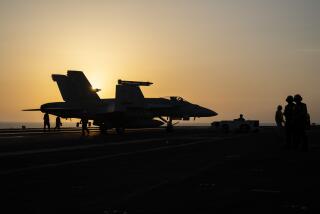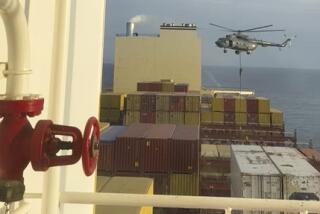U.S. Warns Iranians on Ship Raids : Weinberger Vows Instant Response if Navy Escort Is Hit
- Share via
WASHINGTON — Defense Secretary Caspar W. Weinberger warned Sunday that an Iranian attack on a U.S. ship escorting oil tankers in the Persian Gulf “would be responded to immediately or even prior thereto.”
Weinberger, in two televised interviews, vigorously endorsed last week’s decision to register Kuwaiti tankers carrying oil to U.S. allies as American-flag vessels. U.S. warships would then be assigned to defend them from attack by either side in the long, bitter Persian Gulf war between Iran and Iraq.
The defense secretary commented just a week after an apparently inadvertent Iraqi missile attack on the U.S. guided-missile frigate Stark killed 37 American sailors in the gulf.
‘A Hostile Act’
Asked on the CBS-TV program “Face the Nation” whether the United States would regard an Iranian attack on a U.S. ship in international waters as an act of war, Weinberger replied that it would be “a hostile act which would be responded to immediately or even prior thereto.” His response left the impression that an attack could be launched against any craft that appeared to be in position to attack a U.S. vessel.
Weinberger said on NBC’s “Meet the Press” that “the purpose of protecting the tankers is so that we don’t get into a shooting war,” but an implicit warning against this approach came from Said Rajaie-Khorassani, Iran’s ambassador to the United Nations.
Asked on the ABC-TV panel show “This Week with David Brinkley” whether Iran would regard it as aggression if a U.S. warship escorted a Kuwaiti tanker, Rajaie-Khorassani replied, “Well, if we have the intention of attacking the Kuwaiti tanker and the United States is going to shield it, then that is what it means.”
Pressed on Intentions
Pressed as to Iran’s intentions under such circumstances, Rajaie-Khorassani said he is no military man and could not say, but he added that if Iran “has the intention of attacking a Kuwaiti tanker, it will continue with that policy, regardless of whose flag it is carrying.”
Weinberger contended during the NBC interview that since the attack on the Stark, “there will be a heightened degree of caution on the part at least of Iraq, and since Iran . . . would not want to take the consequences, I’m sure that they themselves will be very much more cautious.”
Arguing for U.S. action to protect the flow of oil from the gulf, which goes primarily to allies in Europe and to Japan, Weinberger said that failure by the United States to respond to “the requests of friendly, moderate Arab nations for assistance” would create “a vacuum, and the Soviets would be very quick to rush into that.”
“Do you want to have a gulf dominated by the Soviets with the ultimate ability to deny access to the oil fields to the West and to ourselves?” Weinberger asked.
No Details on Protection
The secretary declined to detail steps that will be required to escort the tankers from Kuwait, which is an ally of Iraq, but said that “there should be air cover; there should be enough ships to protect the commercial ships they are escorting.”
If friendly Persian Gulf states help in this regard, he said, it would be “a very desirable addition.” He said gulf states, including Saudi Arabia and Bahrain, had afforded logistical support.
Another government official, asking not to be identified, said that talks have been under way with the Saudis aimed at agreement on refueling U.S. planes at Saudi bases, a step that would simplify the air patrols for carrier-based aircraft.
The Persian Gulf is too small for carriers, since the huge ships and their escorts need sea zones 200 miles in radius to launch and recover their planes.
According to the same source, the tempo of informal talks with the British and French about cooperative military planning in the gulf has picked up since the attack on the Stark, and there are prospects of a decision within the next week. If there is an agreement on cooperation, he said, it most likely will be “with, or in coordination with, the British.”
Fear of ‘Soviet Lake’
Weinberger argued during the CBS interview that the alternative to the stern course the Administration is adopting in the Persian Gulf would be “a very much more difficult and dangerous world” in which the Persian Gulf, now international waters, could be “turned into a Soviet lake.”
“These are very real possibilities, and what you have to do is prevent their happening,” Weinberger said. “And that is a risky business--preserving your freedom is risky business.”
Senior senators accentuated the risks during televised interviews Sunday. Former Navy Secretary John F. Lehman Jr. also conceded them, but he endorsed Weinberger’s “sensible” view on how to handle threatening aircraft.
Lehman, appearing on the Brinkley show, said the Stark had five systems in good working order that could have shot down the Exocet missile that set it afire, but they were not used because the frigate was on a peacekeeping mission.
The decision to convoy tankers though the gulf “greatly increases the probability of an act of war,” Lehman said, and therefore, he argued, “we’ve got to bring the allies in to get a clear understanding of who is going to do what if such an act of war takes place.”
Appearing later on the same program, Sen. John Glenn (D-Ohio), a member of the Armed Services Committee, said the Administration’s decision to escort shipping in the gulf involves “a lot of deployment of forces and equipment far, far beyond anything we’ve contemplated so far,” including a new port of call for U.S. ships in the region.
Lugar Voices Concern
Sen. Richard G. Lugar (R-Ind.), former chairman of the Foreign Relations Committee, said during an interview on NBC that the United States “cannot walk away from the Persian Gulf,” but he voiced concern that “there will be losses down the trail” and agreed with a questioner that the Reagan Administration has yet to make clear to the nation its policies in the area.
Declaring it to be “in the very best interests of this Administration right now to set up a consultation procedure” with Congress, Lugar noted that the Senate voted 91 to 5 last week for a resolution asking the Administration to define U.S. objectives and to state precisely “why we are in this particular predicament.”
“Specifically,” he said, “will the Saudis assist us? Will there be air cover? Will there be help by the surrounding Arab states? Will Great Britain and France, who have a very vital interest in an out-of-area NATO situation here, be of assistance too?”
Lugar agreed with a questioner that presidential invocation of the War Powers Resolution of 1973 is “clearly indicated by any reading of the act” because of imminent danger to U.S. forces. The resolution, adopted at the end of U.S. fighting in the war in Vietnam, requires the President to notify Congress within 48 hours when U.S. forces confront a combat situation and specifies that those forces must be withdrawn after 60 days unless Congress authorizes a longer deployment.
Sen. Jim Sasser (D-Tenn.), interviewed by CBS while on a fact-finding visit to the gulf oil state of Bahrain, voiced “grave doubts about the wisdom” of escorting Kuwaiti tankers and said “the burden of proof is going to be on the Administration” to justify it.
“It’s a very dangerous business,” Sasser said, “and you only have to see the devastation on the Stark to realize what a dangerous business it is.”
More to Read
Sign up for Essential California
The most important California stories and recommendations in your inbox every morning.
You may occasionally receive promotional content from the Los Angeles Times.










